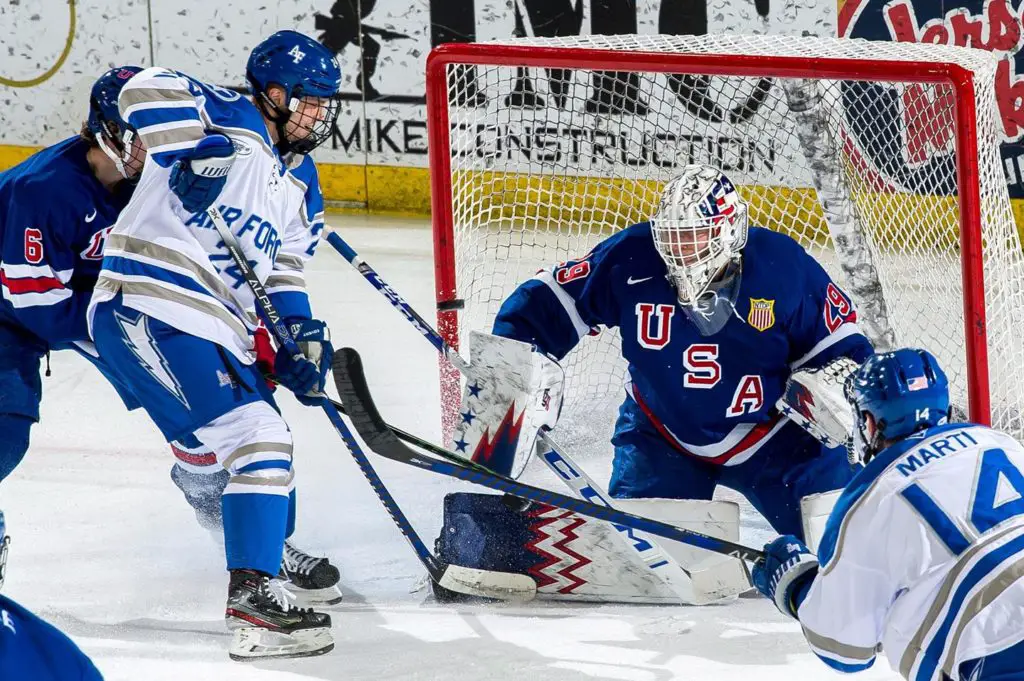
College hockey season is supposed to be formulaic.
There’s a comforting structure to the way games are played and the way the season flows naturally through stages. The early season non-conference games offer first looks at potential contenders, and initial league games offer critical points at a time when teams are mostly unknown. The initial October teams are eventually joined by the Ivy League programs, and college hockey flows through Thanksgiving until the December holiday break’s first respite.
Nothing about this year is ordinary, though, and the entire structural approach to a season is gone.
It runs deeper than the initial stories about teams opting in or out and which rosters are on pause during the COVID-19 pandemic. It’s more condensed and more frenetic, and both coaches and players are holding onto the roller coaster as it hurdles through the unknown.
“Everything’s been different,” Air Force coach Frank Serratore said. “Not only did we not have our Canadian team, (but) we basically lost the first two months. As a hockey coach, there’s the beginning of October when our football team plays Navy on Saturday, and we play a Canadian team on Sunday to get our season going. We would go from there into our regular season. It is what it is, and you deal with it, but it’s just been different from past years.”
This was always going to be an exceptionally strange year for the Falcons after Atlantic Hockey reconfigured its schedule around its geographical outlier. The conference broke up into two, five-team pods and scheduled five games for each matchup. As the only school without a logical fit into either the east or west, the Colorado-based service academy instead drew two games against every team, ensuring an equal number of games on the preseason schedule.
The arrangement allowed teams to schedule non-conference games against available opponents, and ECAC immediately filled the void with its four remaining programs after the Ivy league, Union and RPI all shut down. The natural pairings between Clarkson, Colgate and St. Lawrence with New York-based schools and between Quinnipiac and the New England-based schools filled voids outside. Air Force, though, was left only with the four games against Long Island after the NCHC announced it would avoid nonconference games before the Omaha pod.
The LIU games weren’t scheduled until January at the earliest, however, so when the opportunity arose this past weekend to play the United States Under-18 National Development Team, the Falcons jumped at the opportunity to skate against a different opponent.
“You cover everything as best you can, but you don’t know what you need to work on until you play a contest,” said Serratore. “That’s where that exhibition game is helpful to start from. Part of (USA Hockey) is that the governing body has their national offices (in Colorado Springs), and they try to get out here once in a while. For us, it was a matter of having a break in our schedule where we had an opening that they were available. Generally, we take a long break at Christmas, but we didn’t start playing until after Thanksgiving. We thought it would be good to fill that void with a couple of games.”
It gave the Falcons two extra hockey games against a skilled opponent, but it further offered two opportunities to improve after unfortunate results against both American International and Robert Morris. They scored four unanswered goals against the U-18s and led, 4-2, after two periods before USA Hockey roared back to tie on Saturday, before a wild game on Sunday ended with an empty net, 3-1 win for the development roster.
“It was more about getting our guys some more games,” Serratore said. “All we’ve done our whole lives is play hockey, and we had an opportunity to play again. We had that open weekend, and we said to get them out here (to Air Force) for some games.
“Those kids are young. They are so talented and well-coached and make plays. They skate, and they already have strength at their age.”
It filled a lost piece of Air Force’s schedule after COVID-19 robbed it of the CIS’s annual Colorado barnstorming tour. It was also a chance to work on a roster devoid of older, experienced veterans, for a team everyone expects and knows will be a factor when hockey resumes in January.
“We’ve had to deal with some issues,” Serratore said. “We’re a little shorthanded. Things haven’t been great to get things going, but I don’t want to make a big deal out of it. You make your adjustments and plan accordingly, whether it’s an exhibition game or a nonconference game or whatever it is.”
No days off
I lost my sense of time last week.
A Massachusetts snowstorm never developed into the predicted blockbuster, and 50-degree temperatures at the end of the week threw me for a bigger loop compared to the cold, blustery midweek climate. My hours were off, and not even a round of golf helped pull me back into normalcy.
That sense of craziness spilled over to college hockey season because everything falls into calmness around the holidays. Schedules pause for semester breaks, and the holiday tournaments revolve around the annual World Junior Championship. My house transforms into a holiday wonderland, and my wife and I spend a weekend night decorating gingerbread houses before Santa wedges down my interfaith chimney.
That’s why Atlantic Hockey’s week differs so much this week. There’s at least one game almost every night. A league game dots Wednesday night, flanked by two games on Tuesday night and Friday night. It’s part of a larger stretch dating back to last Friday’s LIU-RIT game.
The hectic schedule won’t stop after the holidays, either, and could very well continue through the days leading up to Christmas. Right now, Canisius and Niagara are set to play on December 22, and Holy Cross and Quinnipiac have a home-and-home scheduled through December 23.
AIC, meanwhile, picks things up on the 26th with a home-and-home against the Bobcats before playing LIU on the 28th, its third game in three days.
All of it plows clear through three non-conference games on December 29 before the season picks back up on January 2.
The holidays used to be the time we all relaxed and caught our collective breath. Now we’re going Mach 2 with our hair on fire.
Sit back and enjoy the ride.
Back in the saddle
Atlantic Hockey returned to the national poll this week when voters awarded Robert Morris the No. 20 spot in the USCHO rankings.
The league finished last season ranked after the COVID-19 cancellation when American International held that same No. 20 spot, but the number was popular among conference members throughout the 2019-20 campaign. Voters ranked Sacred Heart throughout much of February after the Pioneers broke through in December, the same month that Army West Point earned the No. 20 hole.
Rankings often reflect the climate of that particular week of a season. They aren’t necessarily a season-long indicator as much as a current snapshot, and I remember bristling at Atlantic Hockey’s consistent lack of respect last season. RIT had opened on a house of fire, and I excoriated the Tigers’ absence in the polls as a negative perception of a good hockey league. Naturally it jinxed the Tigers into five losses in their next six games, but I feel like I had a good point there.
Polling is more volatile in every sport in 2020, and it’s going to get even weirder after January 1. Teams playing through the interim have more opportunity to race up the polls if they can register some huge wins, and the lack of a Pairwise Rankings will inevitably result in even more explosiveness around this year’s national tournament.
Atlantic Hockey is registering the eighth anniversary of its only two-team foray into the NCAA Tournament this year, and the memory of Niagara’s at-large bid is fading a little bit into the deep rear view mirror. The wild card nature of this year, though, is an opportunity to break that streak, but it starts by convincing pollsters of the competitiveness and parity that exists within this league.
Games of the week
There are games in Western New York this weekend, but I’m choosing to focus on one matchup.
We all lost a potentially electric matchup last year when the postseason’s premature ending cost us the AIC-Bentley series. Those two teams were at the height of their powers, and each entered that series playing great hockey. Bentley won seven of its last eight league games before the playoffs and crushed Canisius in the first round, and AIC’s 2-1 win at the DeFelice Ice Rink in January had one of the best periods of college hockey, period.
This weekend is the first meeting between those two teams since the playoffs ended, and it’s the first postseason rematch of the Atlantic Hockey season. It’s actually one of only two possible rematches under the new alignment since it was the only divisional series, but RIT won’t play Air Force until it travels to Colorado in February.
This series has history, intrigue, and good hockey. It has two teams who elevated their games when it mattered most last year. It has two friendly coaches who echo each other on the bench and know how to motivate their rosters. And it has one broadcaster who is probably going to drink way too much coffee on Friday before the game drops the puck at Bentley at 5 p.m.


